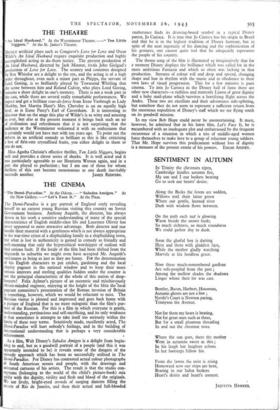THE CINEMA
The Demi-Paradise is a gay portrait of England coyly revealing herself to an earnest young Russian visiting this country on Soviet Government business. Anthony Asquith, the director, has always shown in his work a sensitive understanding of many of the special characteristics of English middle-class life and Laurence Olivier has never appeared to more attractive advantage. Both director and star handle their material with a gentleness which is not always appropriate to the war-time crises of a shipbuilding family in a shipbuilding town, but what is lost in authenticity is gained in comedy so friendly and well-meaning that only the hypercritical worshipper of realism will find serious fault. If the locale of the film had been shifted from the shipyards to suburbia we might even have accepted Mr. Asquith's caricatures as being as just as they are funny. For the determination of his English characters to put cricket, gardening and the local charity pageant in the national window and to keep their more serious interests and sterling qualities hidden under the counter is not the principal characteristic of the whole of this nation of shop- keepers! Felix Aylmer's picture of an eccentric and mischievously absent-minded engineer, enjoying at the height of the blitz the local pageant committee's presentation of the Roman invasion of Britain is something, however, which we would be reluctant to miss. The Russian visitor is pleased and impressed and goes back home with a picture of England that is no more eulogistic than the film's por- trait of the Russian. For this is a film in which everyone is gentle, understanding, pertinacious and self-sacrificing, and its only weakness is that sometimes it attempts to take itself too seriously within the limits of these rosy terms. Sensitively made, excellently acted, The Demi-Paradise will hurt nobody's feelings, and in the building of international- understanding that is perhaps a very considerable achievement.
As a film, Walt Disney's Saludos Amigos is a delight from begin- ning to end, but as a• goodwill portrait of a people (and this it was apparently intended to be) it reveals some of the dangers of the comedy approach which has been so successfully utilised in The Demi-Paradise. For Disney has contrasted actual colour photographs of South American scenes and people, with the drawings and animated cartoons of his artists. The result is that the studio con- ceptions (belonging to the world of the child's picture-book) mix oddly with the dignity, virility and flesh and blood of the originals. We see lively, bright-eyed crowds of surging dancers filling the streets of Rio de Janeiro, and then their actual and full-blooded
exuberance finds its drawing-board symbol in a typical Disney parrot, Jo Carioca. It is true that Jo Carioca has his origin in Brazil and that he is in the highest tradition of Disney humour, but in spite of the neat ingenuity of his dancing and the sophistication of his gestures, one cannot quite feel that he adequately represents the people of his country.
The theme song of the film is illustrated sg imaginatively that for a moment Disney displays the brilliance which was called for in the more ambitious Fantasia and which so often was lacking in that production. Streams of colour roll and drop and spread, changing shape and hue in rhythm with the music and in obedience to their own laws of visual progression. This for a few minutes is pure cinema. To join Jo Carioca in the Disney hall of fame there are other new characters—a ruthless and matronly Llama of great dignity and a baby mail-plane which survives a horrifying flight across the Andes. These two are excellent and their adventures side-splitting, but somehow they do not seem to represent a sufficient return from the enormous expedition of Disney's staff which we see flying south on its goodwill mission.
In my view Bob Hope could never be unentertaining. It must, however, be admitted that in his latest film, Let's Face It, he is encumbered with an inadequate plot and embarrassed by the frequent recurrence of a situation in which a trio of middle-aged women force themselves to make love to a group of reluctant young soldiers. That Mr. Hope survives this predicament without loss of dignity is a measure of the present extent of his powers. EDGAR ANSTEY.


























 Previous page
Previous page